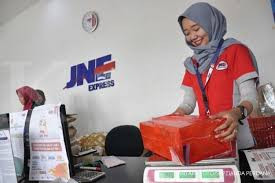Popular Reads
Top Results
Can't find what you're looking for?
View all search resultsPopular Reads
Top Results
Can't find what you're looking for?
View all search resultsCourier companies raise more revenue, hire new workers amid pandemic
Online sales were almost five times higher in April than January, with food and beverage products leading the surge, according to data from Statistics Indonesia (BPS).
Change text size
Gift Premium Articles
to Anyone
 A staff member at courier company PT Tiki Jalur Nugraha Ekakurir (JNE) checks on a package ready for shipment in this undated photo. With more and more consumers moving from offline to online shopping, courier companies have seen increased business delivering goods amid the COVID-19 pandemic restrictions. (Antara/Septianda Perdana)
A staff member at courier company PT Tiki Jalur Nugraha Ekakurir (JNE) checks on a package ready for shipment in this undated photo. With more and more consumers moving from offline to online shopping, courier companies have seen increased business delivering goods amid the COVID-19 pandemic restrictions. (Antara/Septianda Perdana)
W
ith more and more consumers moving from offline to online shopping, courier companies have seen increased business delivering goods amid the COVID-19 pandemic restrictions, especially during the Ramadan and Idul Fitri celebrations.
Courier service company PT Global Jet Express, which owns the J&T Express brand, reports that its delivery volume was higher by 15 percent amid the COVID-19 pandemic compared with normal times, according to Elena, the company’s public relations executive.
During Ramadan alone, J&T Express, which has more than 4,000 operating points nationwide, saw its delivery volume surge by 50 percent from a year earlier. The firm regards the Islamic holy month as its annual peak season.
“We always make preparations every time we enter a peak season, including hiring new people to anticipate a surge so that we can provide our best service to customers,” Elena told The Jakarta Post via text message on June 19.
Delivery companies have managed to book growth amid the pandemic-induced economic downturn because citizens are staying at home to comply with regional administrations’ large-scale social restrictions.
Online sales volume were almost five times higher in April than January, with food and beverage products leading the surge, according to data from Statistics Indonesia (BPS).
Courier company PT Tiki Jalur Nugraha Ekakurir (JNE), which operates 6,000 service centers nationwide, also booked increases in revenue and delivery, according to Eri Palgunadi, the company’s marketing vice president.
Since the start of the year, JNE recorded a 20 percent increase in the number of deliveries. The firm handled the surging demand with its existing 40,000 workforce without hiring new staff, despite longer delivery times to some places.
JNE has also been operating with some adjustments, including implementing COVID-19 safety protocols and temporarily suspending its overnight-delivery service in some areas.
“We remain optimistic that we can consistently grow by 30 percent this year like the previous years,” Eri told the Post via text message on June 19. “But the impact of the pandemic, or ‘new normal’, is still dynamic. We continue trying our best to do everything normally while monitoring the latest developments.”
Mohamad Feriadi, the chairman of the Indonesian Express Couriers Association (Asperindo), which represents over 300 companies across the country, said on June 19 that while staying at home, people were buying staple, household needs and medicines through the internet and this benefited courier companies with a business-to-consumer (B2C) business model.
The government’s ban on the mudik (Idul Fitri exodus), when around 18 million people normally travel to their hometowns to celebrate the holiday, also raised delivery volumes as people shipped gifts to their families, he added.
“Delivery companies are basically inside the e-commerce ecosystem,” Feriadi said in a phone interview. “Those providing B2C services are unlikely to have seen a decline in delivery volumes.”
But firms providing business-to-business (B2B) and business-to-government (B2G) services are worse off, according to him. Many non-essential businesses stopped shipping products as they suspended operations and factories did not function at maximum capacity, causing courier companies’ revenues to fall.
Losses at firms with B2B and B2G business models led the warehouse and courier service industry to contract by 0.73 percent year-on-year in the first quarter of 2020, data from BPS show.









